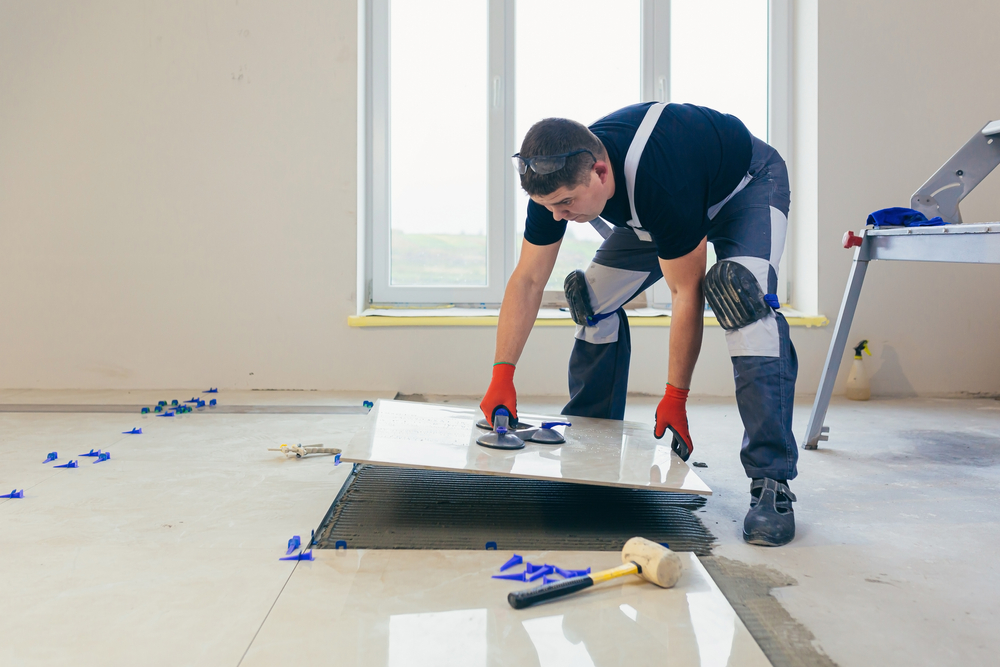How much does it cost to tile a floor? [2026]
$600 to $1,000
These prices are based on national averages
These prices are based on national averages

The cost of tiling a floor can vary based on several factors, including the type of tiles chosen, the size and complexity of the area, labor costs, and additional materials needed. Here’s a breakdown to estimate the expenses for tiling a floor:
Tiling a floor involves several factors including tile type, size, quality, and labor costs. By consulting with professionals and gathering multiple quotes, you can ensure a budget-friendly and effective approach to achieve your desired flooring outcome.
Get answers here
The cost of tiling a floor can be influenced by several factors: Tile Type: The type of tile you select, such as ceramic, porcelain, natural stone, or vinyl, impacts the cost. Premium tiles generally cost more than standard options. Tile Size and Design: Larger tiles or those with intricate designs and patterns can be more expensive. Custom or designer tiles will also increase costs. Floor Area: The size of the floor area being tiled directly affects the total cost. Larger areas require more materials and labor. Surface Preparation: Additional costs may arise if significant preparation work is needed, such as removing old flooring, leveling the surface, or repairing subfloor damage. Labor Costs: Hiring a professional tiler or contractor will contribute to the overall expense. Rates vary based on location, complexity, and the tiler’s expertise.
The duration for tiling a floor depends on: Floor Size: Larger floors will naturally take more time to tile compared to smaller spaces. Tile Type and Complexity: Simple tiles and layouts are quicker to install, whereas complex patterns or high-end tiles may extend the installation time. Surface Preparation: Additional time may be required if extensive preparation or repairs are needed. Installer Experience: A professional with experience will generally complete the job more efficiently than a novice. On average, tiling a floor can take between 2 to 5 days, including time for grout and adhesive to set, as well as any finishing work.
Several types of tiles are commonly used for flooring: Ceramic Tiles: Affordable and versatile, ceramic tiles are suitable for many areas and come in various sizes and finishes. Porcelain Tiles: Known for their durability and water resistance, porcelain tiles are ideal for high-traffic areas and moist environments. Natural Stone Tiles: Tiles like marble, granite, and travertine offer a luxurious look but may require additional maintenance and sealing. Vinyl Tiles: Cost-effective and available in various designs, vinyl tiles are durable and easy to maintain, suitable for both residential and commercial spaces.
While tiling a floor can be a DIY project for those with some experience, there are benefits to hiring a professional: Expertise: A professional ensures that the installation is done correctly, with precise alignment and secure adhesion. Efficiency: Professionals can complete the job more quickly and efficiently, saving you time and effort. Problem Resolution: An experienced installer can handle unexpected issues, such as uneven subfloors or complex layouts. If you have the skills and tools, you might choose to tackle the project yourself. However, for a flawless finish and to avoid potential issues, hiring a professional is often recommended.
When selecting tiles for flooring, consider the following: Durability: Choose tiles that can withstand foot traffic and wear. Porcelain and ceramic are generally more durable options. Ease of Cleaning: Opt for tiles that are easy to clean and maintain, especially for areas prone to spills and stains. Slip Resistance: For safety, especially in high-traffic or wet areas, select tiles with a slip-resistant rating. Style and Aesthetics: Choose tiles that match your decor and personal style. Consider color, texture, and pattern. Budget: Set a budget that includes not only the cost of the tiles but also installation, grout, and any additional materials needed.
Today is the day to build the home of your dreams or get that repair fixed. Share your project with local vetted tradespeople and begin the journey.

Our tradespeople offer guarantees ranging from 1 to 12 months
We show your job to relevant tradespeople near you
Our feedback system ensures that tradespeople are rewarded.